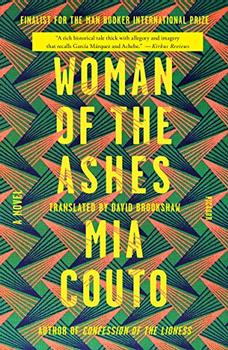Summary | Excerpt | Reviews | Beyond the Book | Readalikes | Genres & Themes | Author Bio

A Sands of the Emperor Novel
by David Brookshaw, Mia Couto
The rest of the story is even more nebulous. At some stage, my dear old father reconsidered, and eventually reached a decision. I would be given a name that was not a name: Imani. At last, the order of the world had been re-established. The attribution of a name is an act of power, the first and most decisive occupation of some foreign territory. My father, who complained so bitterly of other people's empires, reaffirmed his status as a little emperor.
I don't know why I am spending so much time explaining all this, for I wasn't born to be a person. I'm a race, I'm a tribe, I'm a sex, I'm everything that stops me from being myself. I'm a black woman, I belong to the VaChopi, a small tribe on the coast of Mozambique. My people dared to oppose the invading VaNguni, warriors who came from the south and installed themselves here as if they were the owners of the universe. In Nkokolani, people say that the world is much too big for one owner alone.
Our land, however, was disputed by two rival overlords: the VaNguni and the Portuguese. That was why they hated one another so much and were at war: they were so alike in their motivations. The VaNguni army was much larger and more powerful. As were their spirits, which ruled on both sides of the frontier that tore our lands in half. On one side, the Empire of Gaza, controlled by the Nguni chief, the emperor Ngungunyane. On the other side, the Lands of the Crown, ruled by a monarch that no African would ever see: Dom Carlos, king of Portugal.
Our other neighbors had adapted themselves to the language and customs of the black invaders arriving from the south. We VaChopi are among the few who inhabit the Lands of the Crown and who allied themselves with the Portuguese against the Empire of Gaza. We are few in number, protected by our pride and surrounded by the khokholos, wooden palisades that we build around our villages. We were so hemmed in by these protective measures that we knew every stone by name. In Nkokolani we all drank from the same well, and one drop of poison would be enough to kill the whole village.
* * *
Countless times we were awoken by our mother's cries. She would sleep and shout, wandering through the house with a sleepwalker's gait. During these nocturnal fits of delirium, she would lead her family on a journey across marshlands and streams and through the landscapes of her imagination. She would return to our old village on the shores of the ocean, where we had been born.
In Nkokolani, we have this proverb: If you want to know a place, speak to those who aren't there; if you want to know a person, listen to that person's dreams. Well, this was our mother's only dream: to return to the place where we had been happy and where we had lived in peace. Her longing was infinite. In fact, is any longing not infinite?
The digressions that occupy my mind are of a very different order. I don't shout or wander through the house. But not a night goes by when I don't dream of being a mother. And today I dreamed yet again that I was pregnant. The curve of my belly rivaled the arc of the moon. But this time, what happened was the opposite of a delivery: it was my child who expelled me. Maybe that is what the newly born do. They free themselves from their mothers, tear themselves away from their mothers' lone, borderless bodies. Well, my dreamed-of baby, a creature without face or name, was ridding itself of me in violent, painful spasms. I awoke in a sweat, with terrible pains in my back and in my legs.
Then I realized: it wasn't a dream, it was my ancestors paying me a visit. They were bringing me a message. I was fifteen years of age, and they were warning me that I was late to motherhood. All the girls of my age in Nkokolani had become pregnant. Only I seemed condemned to a barren fate. In fact, I wasn't just a woman without a name. I was a name without a person. Without substance. As empty as my belly.
* * *
In our family, every time a child is born, we leave our windows open. It's the opposite of what the rest of the village does. Even when the heat is at its greatest, other mothers wrap their babies in thick blankets, imprisoning them in the darkness of their rooms. In our house, we don't do this; the doors and windows stay wide open until the newborn's first bath. This unbridled exposure is, in fact, a form of protection: the new creature is filled with light, sounds, and shadows. And that is how it has been since time itself was born: only life can defend us from the business of living.
Excerpted from Woman of the Ashes by Mia Couto. Copyright © 2018 by Mia Couto. Excerpted by permission of Farrar, Straus & Giroux. All rights reserved. No part of this excerpt may be reproduced or reprinted without permission in writing from the publisher.
Your guide toexceptional books
BookBrowse seeks out and recommends the best in contemporary fiction and nonfiction—books that not only engage and entertain but also deepen our understanding of ourselves and the world around us.